Kurze Geschichte des Projekts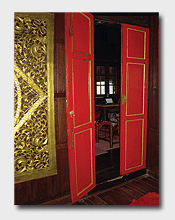
Die Wurzeln verweisen weit in die Zeit als Rock & Rebellion nicht eine verkaufsstrategische T-Shirt-Collection war, sondern der Traum einer Generation, die das andere, das wahre Leben suchte. So stürmte eine Horde versprengter Gymnasiasten in Köln die Messehalle am 1. Mai 1976 als ginge es in ein Rolling Stones Konzert. Die Ordner hatten nicht damit gerechnet, denn der Saal war bestuhlt, in der ersten Reihe saßen gutbetuchte ältere Semester, und von der Bühne sprach sanft ein Gentleman als stände er auf jenem Berge: „Let the children come …, let them“.
Es war die Zeit als die, die Geld hatten, noch gerne gaben; niemand nahm es Leonard Cohen übel, dass er die „Kinder“ noch vor der ersten Reihe an der Bühne Platz nehmen ließ, nicht einmal die Ordner, sie zuckten die Schultern, während Leonard sang:
There is a war between the rich and poor,
A war between the odd and the even.
There is a war between the ones who say there is a war
And the ones who say there isn't.
pick up your tiny burden, let's all get even,
Why don't you come on back to the war, can't you hear me speaking?
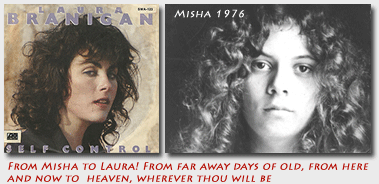
Wir hörten ihm zu. Das Konzert wurde, so wie es für so viele der Erstbesucher eines Leonard Cohen Konzerts bis in die heutige Zeit geblieben ist, zu einer Art Erweckungserlebnis. Wir trampten in die nächste Stadt zum nächsten Konzert. In Saarbrücken winkte Laura Branigan uns von der Bühne zu; und in Mainz schleuste sie uns heimlich in die Rheingoldhalle. Sie war nicht viel älter als wir, 18 Jahre jung. Danke Laura!
Rock’n’Roll, I gave you ... Zurück aus Goa, Indien, war Misha G. Schoeneberg ein Jahrzehnt Mitglied der Musiker-Kommune Ton Steine Scherben. Er war Teil des Management-Duos mit Claudia Roth, machte Licht- & Bühnendesign, schrieb Songs für die Gruppe, später für Rio Reiser, sowie er seine eigene Platte – Sternschnuppen, Rockpoesie in Deutsch – aufgenommen hatte.
Geburt der Idee in Wissenschaft. Die Mauer fiel. Es wurde Zeit, den Dingen mehr auf den Grund zu gehen. Misha nutzte die Chance an der Humboldt-Universtät zu Berlin zu studieren, machte Abschlüsse u. a. in Literatur- und Südostasien-Wissenschaften. In den vielen Seminaren zu Übersetzungs-Theorien wurde die Idee geboren. Rilke hatte es getan, Stefan Zweig auch: Lyrik anderer Dichter ins Deutsche zu übertragen ohne dass das Eigentliche – die lyrische Kraft der Poesie – verloren ging.
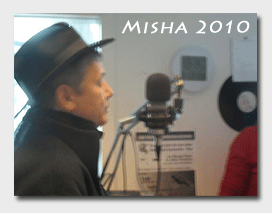 Der Handschlag. „Das, was Rilke für die Klassiker tat, möchte ich für Leonard Cohen tun.“ Mit diesen Worten sprach Misha bei Rolf Budde vor; mit diesen Worten versprach Misha Leonard Cohen beim Konzert im Tempodrom am 25. Mai 1993 in Berlin für all seine Songs adäquate Übertragungen in Deutsch. Leonard Cohen gab seine Antwort in seiner ihm eigenen Art: „I’m very proud that my German publisher is Buddha, so if he agrees, I do!” Der Budde-Verlag gab vollen Support. Wenn es fertig würde, sollte es ein Buch mit allen Songs und Noten sowie singbaren Übertragungen werden. Rio Reiser wollte singen. Es wurde …, aber nicht fertig: Rio Reiser verstarb 1996, Leonard Cohen ging in ein buddhistisches Kloster, Misha für Jahre als Asien-Wissenschaftler in die Berge nach Laos und Nordthailand. Der Handschlag. „Das, was Rilke für die Klassiker tat, möchte ich für Leonard Cohen tun.“ Mit diesen Worten sprach Misha bei Rolf Budde vor; mit diesen Worten versprach Misha Leonard Cohen beim Konzert im Tempodrom am 25. Mai 1993 in Berlin für all seine Songs adäquate Übertragungen in Deutsch. Leonard Cohen gab seine Antwort in seiner ihm eigenen Art: „I’m very proud that my German publisher is Buddha, so if he agrees, I do!” Der Budde-Verlag gab vollen Support. Wenn es fertig würde, sollte es ein Buch mit allen Songs und Noten sowie singbaren Übertragungen werden. Rio Reiser wollte singen. Es wurde …, aber nicht fertig: Rio Reiser verstarb 1996, Leonard Cohen ging in ein buddhistisches Kloster, Misha für Jahre als Asien-Wissenschaftler in die Berge nach Laos und Nordthailand.
Die Künstler-Initiative. Nach 15 Jahren Pause kam im Jahr 2008 die sensationelle Nachricht: Leonard Cohen ist längst zurück in der Welt und geht auf große Welt-Tournee. Misha lebte mittlerweile wieder in Berlin als Autor und Dozent, ist eingebunden in der Musikerszene aus jung und alt.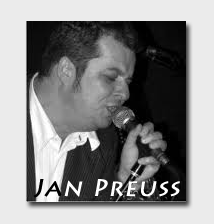
Jan Preuß, Musiker aus Brandenburg, ist es zu verdanken, dass das Projekt Leonard Cohen in Deutsch nach all den Jahren der Ruhe aus dem Dornröschenschlaf wiederbelebt wurde. Jan wollte unbedingt Leonard Cohen auf Deutsch singen, er bat Misha um die Texte.
Doch die Sache hat auch eine vertragsrechtliche Seite. Sony/ATV war der neue deutsche Verleger von Leonard Cohen. Sie suchten noch nach dem talentierten Texter, als er längst vor ihnen stand. Man sprach in der Musikerszene über die Sache. Jeder, der gefragt wurde, wollte an einem Tribut-Album für Leonard Cohen teilnehmen. Sogar die ganze Garde der neuen, wirklich jungen Generation von Musikern bekannte sich dazu, dass Leonard Cohen eine der Inspirationsquellen sei, an der sie sich laben. Auf der Geburtstagsparty von Max Prosa – er ist als junger deutscher Lyriker bei Sony/Music unter Vertrag –, wurde Hallellujah in Deutsch aufgenommen. Misha schickte das Take und einen Brief an Leonard Cohen:

Die Antwort kam in weniger als 18 Stunden:

Die Sensation war perfekt, das Projekt konnte starten.
Der Verlag. Patrick Strauch, seit Dezember 2004 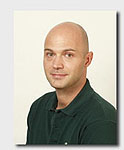 Managing Director von Sony/ATV Germany, bemerkte nicht ohne einen gewissen Stolz, dass sämtliche Subverlagsrechte an den Titeln von Leonard Cohen bei Sony/ATV liegen, und somit ihm, als der deutsche Verleger dieses großen Ausnahmekünstlers, eine besondere Verantwortung zufällt. Er unterstützte die Idee. Managing Director von Sony/ATV Germany, bemerkte nicht ohne einen gewissen Stolz, dass sämtliche Subverlagsrechte an den Titeln von Leonard Cohen bei Sony/ATV liegen, und somit ihm, als der deutsche Verleger dieses großen Ausnahmekünstlers, eine besondere Verantwortung zufällt. Er unterstützte die Idee.
„Jeden Tag bekamen wir hier eine Anfrage für einen deutschen Subtext für Hallelujah herein; das war teilweise so schlecht, dass man das gar nicht weiter leiten mochte“, berichtete Ulrike Alves Rocha, Senior Copyright Manager, Sony/ATV. Sie wurde die Mutter des Projekts. Denn von Schoenebergs Übersetzungen war sie genauso überzeugt wie zuvor schon Robert Kory, Cohens Manager.
Man war sich schnell einig: Wir müssen etwas aus der Begegnung machen. Patrick Strauchs Idee: Wir sind ein Verlag, wir müssen für unsere Künstler Geld verdienen. Doch jenseits aller Verkaufszahlen hat ein Verlag auch die Verpflichtung, einen außergewöhnlichen Künstler wie Leonard Cohen, der damals grade den Prinz-von-Asturien-Preis für Literatur (zweit-wichtigster Literaturpreis neben dem Nobelpreis) erhalten hatte, ins rechte Licht zu stellen. Wir wollen ihn durch etwas ganz Außergewöhnliches würdigen:
Ein Doppel-Album mit Leonard Cohen Songs in Deutscher Übertragung.
Ein Tribut an Leonard Cohen, interpretiert von deutschsprachigen Künstlern aller Art, genre- und generationsübergreifend: jung & alt, berühmt & alternativ, Stars & Newcomer.
Die Firma. Mit Willy Ehmann, Senior Vice President Domestic GSA bei Sony Music Entertainment Germany, fand sich nicht nur der Mann, der das auch alles umzusetzen vermochte, sondern auch ein Chef, der weiß, worüber er redet. Es kann nicht falsch sein, wenn man einen Künstler wie Leonard Cohen, der mit seinem Werk die großen Themen der Menschheit berührt, von ihren Inhalten her betrachtet. Und selbst wenn er nicht zig Millionen von Alben verkauft, so ist der Einfluss, den Leonard Cohen auf Songschreiber aus aller Welt nahm (und somit auf die Pop-Musik-Branche allgemein) derart profund, weitreichend und Grenzen überschreitend, dass er nur mit dem eines Bob Dylans verglichen werden kann.
|
A Short History Of The Project
The roots start back in the time when Rock & Rebellion was not a strategic selling T-shirt-collection, but the dream of a generation, which was searching for the other, the real life. So, on May 1st 1976 a bunch of high school students stormed the Messehalle in Cologne as if they were going to a Rolling Stones concert. The security didn’t expect this, because the room was seated and the first row was occupied by well-off, elderly people. And there onstage a gentleman spoke softly as if he stood on that mountain: "Let the children come ..., let them.”
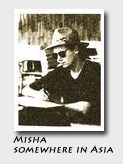
That was the time when the rich still enjoyed spending; no one was bothered when Leonard Cohen let “the children” sit down just in front of the first row by the stage not even the security guards, they shrugged their shoulders, while Leonard sang:
There is a war between the rich and poor,
A war between the odd and the even.
There is a war between the ones who say there is a war
And the ones who say there isn’t.
pick up your tiny burden, let's all get even,
Why don't you come on back to the war, can’t you hear me speaking?
We listened to him. The concert was - as it still is today for so many of those who visited a Leonard Cohen concert for the first time -, a kind of awakening experience. We hitchhiked to the next concert, next city. In Saarbrücken Laura Branigan waved to us from the stage, and in Mainz, she secretly smuggled us into the Rheingoldhalle. She was not much older than we were, 18 years young. Thank you Laura!
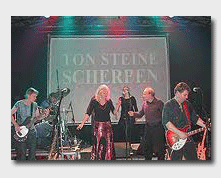
Rock’n’roll, I gave you ... Back from Goa, India, Misha G. Schoeneberg became a member of the music commune Ton Steine Scherben and stayed for nearly one decade. He was part of the management-duo with Claudia Roth, did stage- & light-design, and wrote songs for the group, later for Rio Reiser; last but not least he recorded his own album – Fallingstars, rock poetry in German language.
Birth of the idea in science. The Berlin Wall was falling. It dawned upon Misha that it was a good time to get to the bottom of things. He started to study at the Humboldt-University of Berlin and got degrees in subjects like literature and Southeast-Asian-science, among others. In the many seminars on translation theories the idea was born. Rilke had done it and so had Stefan Zweig; they transformed the poetry of other poets into German language without losing sight of the real thing: the magical power of poetry.
The handshake. "What Rilke did for the classic poets, I want to do for Leonard Cohen." With these words Misha asked Rolf Budde, the German Publisher of LC, to support the idea; and with these words Misha promised Leonard Cohen at his concert on 25th May 1993 at the Tempodrom in Berlin, to produce equivalent translations for all of his songs. Leonard Cohen gave his answer in his own special way: "I'm very proud that my German publisher is Buddha, so if he agrees, I do." The Budde-publishing company gave its full support. Once it would be completed, it should be a book with all the songs and sheet music as well as singable translations into German. Rio Reiser wanted to sing. It was started ..., but was not finished: Rio Reiser died in 1996, Leonard Cohen resorted to a Buddhist monastery, Misha went up to the mountains of Laos and northern Thailand as an Asia-scientist for years.
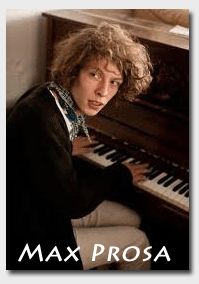 The Artist's initiative. In the year 2008, after a break of 15 years, came the sensational news: Leonard Cohen is back and going on world-tour again. Misha was now living in Berlin as an author and lecturer, connected to the music scene from the days of old as well as to the young-ones. The Artist's initiative. In the year 2008, after a break of 15 years, came the sensational news: Leonard Cohen is back and going on world-tour again. Misha was now living in Berlin as an author and lecturer, connected to the music scene from the days of old as well as to the young-ones.
We all have to thank Jan Preuss, a highly gifted singer from Brandenburg, for arousing the project “Leonard Cohen in German” from its “deep sleep of the beauty” after all these years of silence. Jan badly wanted to sing Leonard Cohen in German, so he asked Misha to hand him the lyrics.
But the whole thing also has a contractual aspect. Sony/ATV was the new German publisher of Leonard Cohen. They were still searching for the talented writer, even when he was actually already right in front of them. So the case was discussed in the German music scene. Everybody who was asked wanted to sing homage to Leonard in German. Even the very new generation of German musicians confessed that Leonard Cohen was a source of inspiration to them. 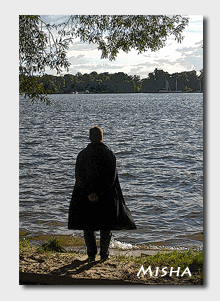 So, at the birthday party of Max Prosa – a young German singer-songwriter signed by Sony/Music – they recorded Hallellujah in German. Misha sent this take and a letter to Leonard Cohen: So, at the birthday party of Max Prosa – a young German singer-songwriter signed by Sony/Music – they recorded Hallellujah in German. Misha sent this take and a letter to Leonard Cohen:

The reply came in less than 18 hours:

The sensation was perfect, the project could commence.
The Publisher. Patrick Strauch, since December 2004 Managing Director of Sony/ATV Germany, remarked not without a certain pride that all rights of publishing of the songs of Leonard Cohen are hold by Sony/ATV. So, he realized, that on him, as he is the German publisher of this great exceptional artist, rest a special responsibility. He supported the idea.
"Every day we got a request for a German subtext for Hallelujah, mostly so lousy that you did not want to manage that on." Ulrike Alves Rocha, Senior Copyright Manager, Sony/ATV reported. She became the mother of the project, the translations of Schoeneberg profoundly convinced her as they did before to Robert Kory, Cohen's manager.
Everybody get quickly clear about it, it came to an agreement, we had to make something special out of it, we had to work it out. Patrick Strauch’s idea: We're a publishing company, we have to earn money for our artists. But beyond all selling-rates a publisher has also the obligation for an extraordinary artist like Leonard Cohen, who at that time has just received the Prince of Asturias Prize for Literature [second most important literary prize behind the Nobel Prize] to set him in the right light, that belongs to him. We want to pay our tribute to Leonard Cohen with something extraordinary:
A double album with Leonard Cohen songs in German language.
A tribute to Leonard Cohen; performed by German artists of all kinds, genres and across generations: young and old, famous and alternative, stars and newcomer.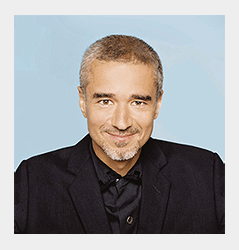
The Company. With Willy Ehmann, Senior Vice President Domestic GSA bei Sony Music Entertainment Germany, the man was found, who was not only able to implement the idea, but also a head who knows what he’s talking about. There can’t be anything wrong to emphasize the significance of an artist like Leonard Cohen, whose work touches the great themes of humanity. And even if he is not selling a bazillion per album, nevertheless is the impact of Leonard Cohen to all the international songwriters around the world (and in general thus on the pop music industry) in such a way profound and extensive, that he can only be compared to Bob Dylan.
|
